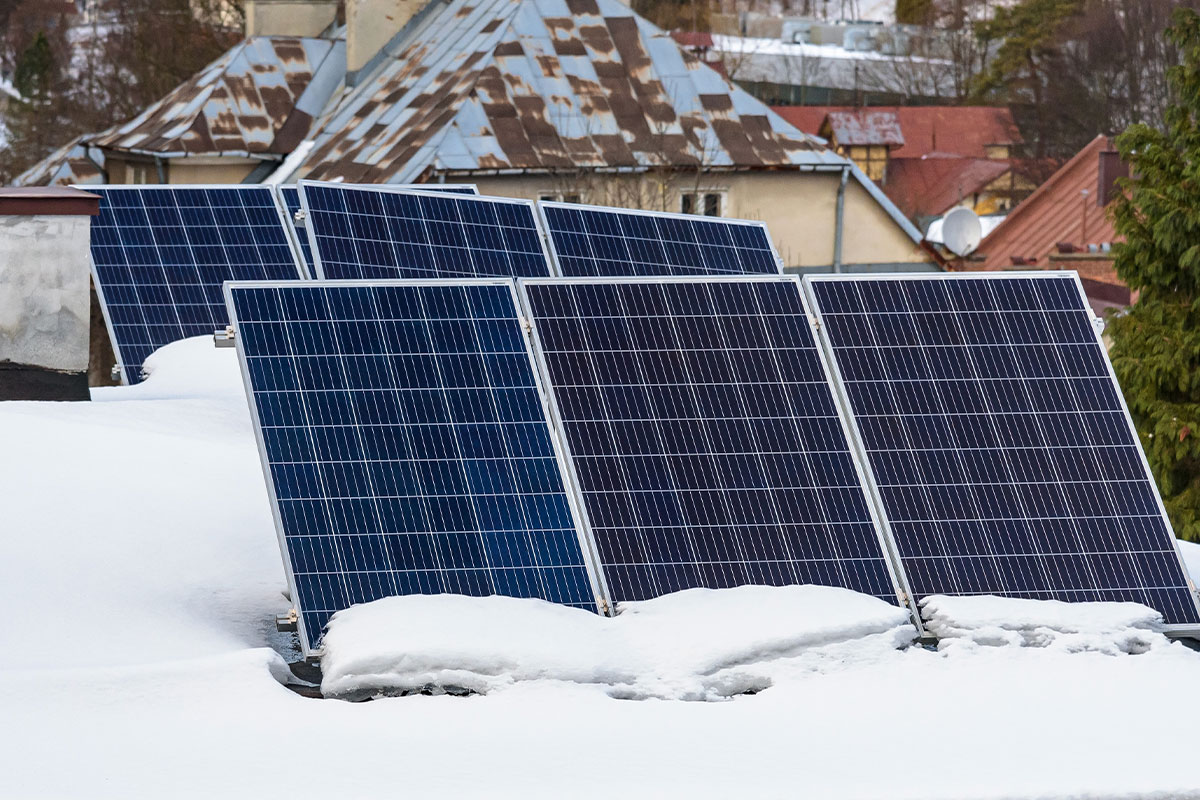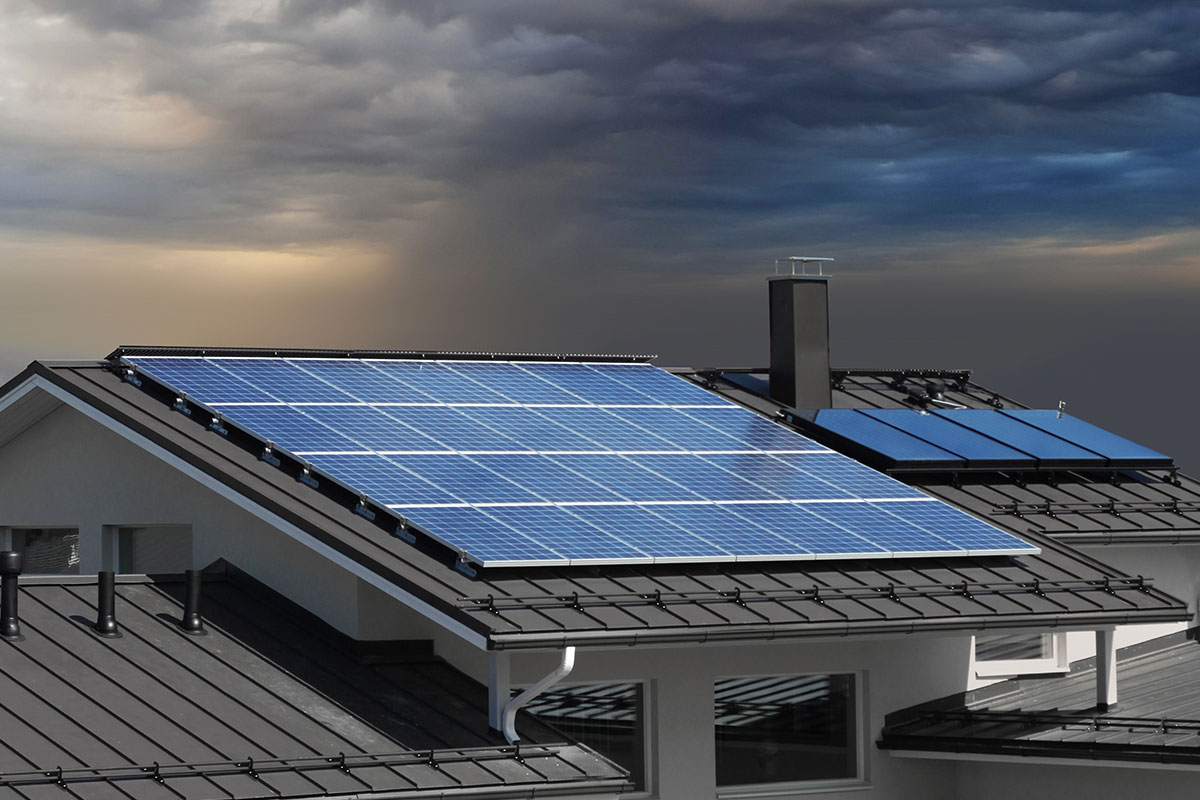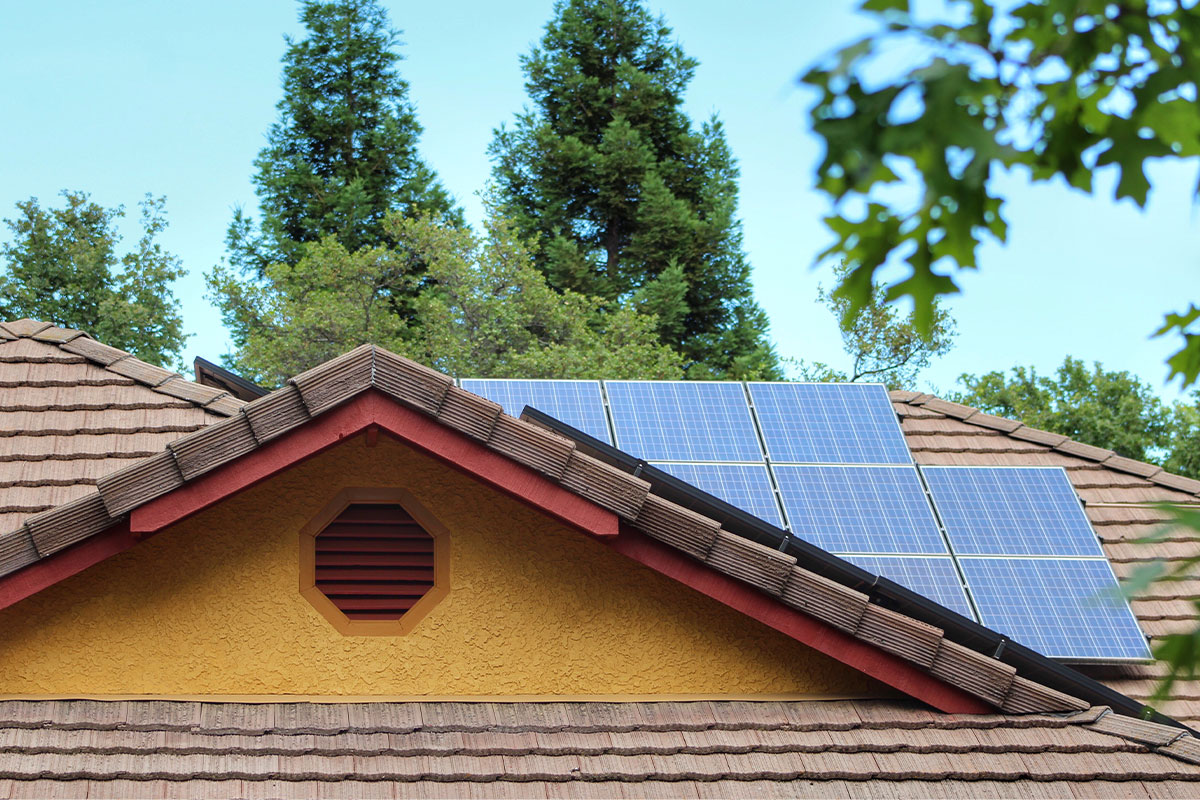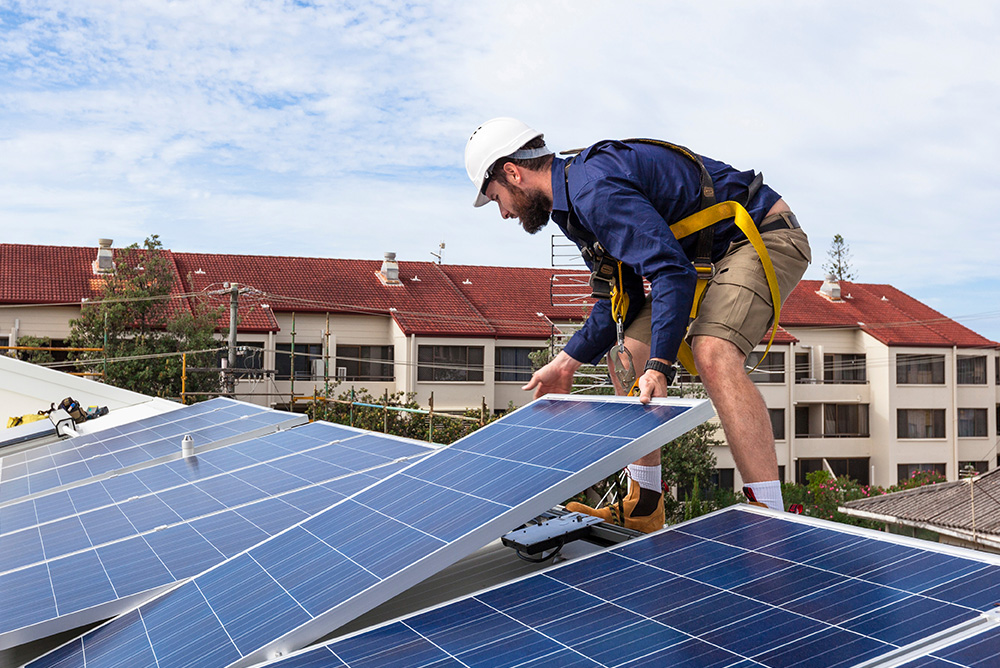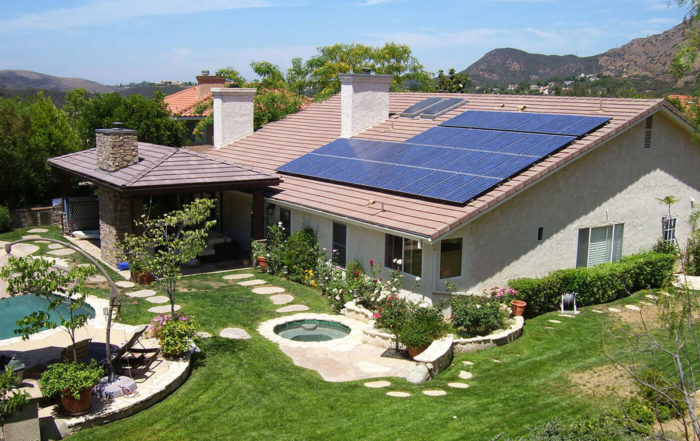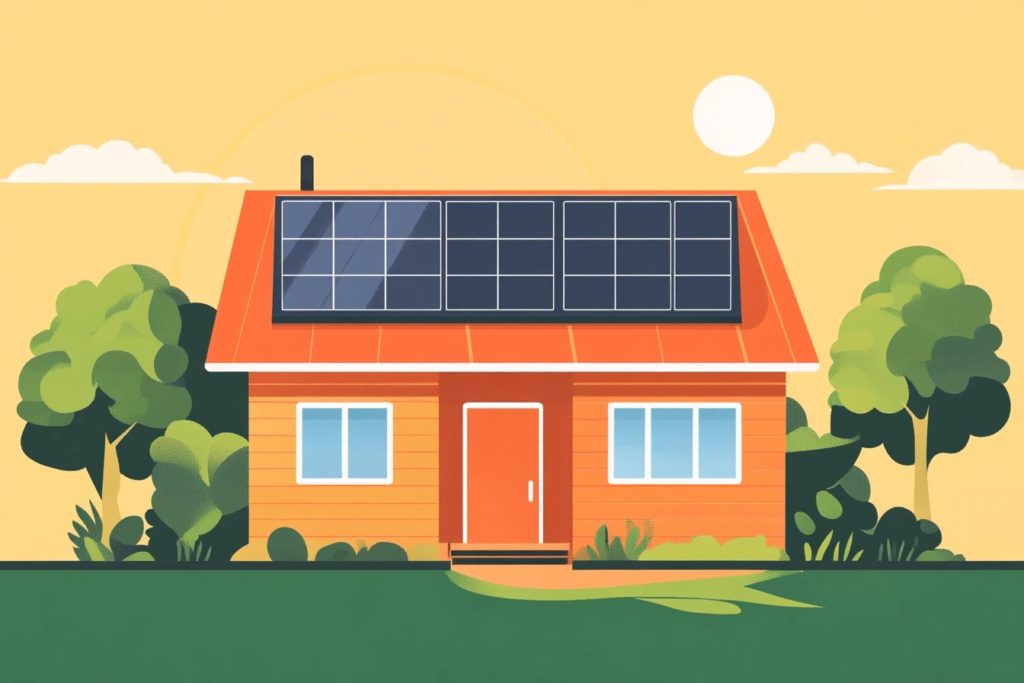Today’s solar panels are far more efficient in a wide variety of weather conditions than the panels of yesteryear. However, there are still some situations where you could experience decreased output from your residential solar system. One of the most common weather events that affects efficiency is snow on solar panels. How much does snow accumulation decrease your solar system’s energy efficiency? And how do you clean snow off solar panels? Let’s dig into the details.
Solar Panels Are Built To Withstand Snow
First off, let’s correct one of the most enduring myths about solar panels. Many people think that solar panels and snow don’t mix well. In actuality, your typical solar panel is manufactured to withstand at least two feet of snow, and most of them go well beyond that level. Considering that solar panels also function quite well in cold weather, there is little-to-no risk of your panels becoming damaged by snow or other wintery conditions.
How do solar panels work with snow on them? While it’s unlikely that your solar panels will be damaged by winter weather, it is true that heavy snowfall can block sunlight from reaching your panels. Because your solar system needs direct sunlight to produce energy, this can have a negative effect on your electricity generation.
However, before you jump up on the roof and start brushing the snow off of your solar panels, you should check with your solar manufacturer. Some solar companies will void your warranty if you remove snow from your panels yourself. If you get the go-ahead from your manufacturer, you can try either sweeping them using a roof rake or a long-handled brush, or you could blast them with water from a hose to melt the snow away.
How To Remove Snow From Solar Panels
Use The Cold Water Method
If you choose the water method, make sure you use cold water, as the temperature differential between cold snow and hot water could crack the glass on your panels. Furthermore, anyone sweeping or raking snow from solar panels should attach a soft cover to make sure you’re not scratching the glass. You should also never use RainX, car wax, rock salt, or other chemicals on solar panels, as all of these materials can cause damage to not only your solar system but also the shingles and other structures on your roof.
The Autonomous Solar Panel
That said, there are some more advanced methods regarding how to remove snow from solar panels on the roof. One option is a relatively recent innovation known as an autonomous solar panel. These panels can sense when there’s snow cover, and they transfer a small amount of energy in the form of heat to clear away the snow. In addition, the Minnesota-based “Solar for Snow” organization recently won a $50,000 prize from the National Renewable Energy Laboratory for their plan to produce solar panels that include nano-materials to self-heat snow-covered panels.
Wait For It To Melt or Slide Off
To be honest, sometimes the best way to get rid of snow on solar panels is to simply wait for it to melt or slide off. Unless there’s a significant amount of caked-on snow cover preventing your solar system from accessing sufficient sunlight, it’s unlikely that you’re losing a significant amount of production. Especially if your solar panels were installed at an angle of 35 degrees or greater, it won’t take much warming to loosen the snow enough to fall off.
Talk With Solar Experts at LGCY Power
As with most aspects of solar panel maintenance, if you have concerns about the buildup of snow on solar panels, you should ask a professional. Our LGCY Power representatives can tell you everything you need to know about how to get snow off of solar panels, and they can also help you figure out the best way to avoid too much snow buildup in the first place.
While solar panels and snow don’t exactly work in harmony, the negative effects of snow on solar panels can be a bit overblown. You might lose a bit of production here and there, but for the most part, it shouldn’t significantly decrease the energy generation from your residential solar system.
Because solar panels produce energy from direct sunlight, it’s pretty obvious that your residential solar system will typically produce more electricity in the summer than it will in the winter. However, there’s quite a bit more to it than you might think, and understanding seasonal solar panel performance can increase your household’s solar savings. Let’s discuss the many ways the seasons affect your energy output and how you can take advantage of them.
Solar Panels Work Best in the Summer Months
Why do solar panels work better in the summer? The longer days certainly help, as your solar panels receive sunlight for more total hours per day than they do in the winter. Furthermore, the angle of the sun provides additional solar panel savings in the summer because the sun’s rays are stronger when it’s directly overhead, as opposed to the lower angle of sunlight in the winter months. This also helps explain why a solar system in Orlando, FL will usually generate more energy per year than the same exact system in Baltimore, MD.
It can be surprising to analyze how much more production you get from your residential solar system during the summer as opposed to the winter. While exact energy levels can fluctuate significantly based on the size and style of your solar system, the age and quality of your solar panels, your location, and daily weather patterns, you can generally expect your system to generate up to 50% more energy in the middle of the summer compared to the dead of winter.
Two-Thirds of Energy Output for the Year Are Generated During This Time
In fact, if you split up the year into two equivalent six-month portions — with the “summer” half running from mid-March through mid-September and the “winter” half stretching from September back into March — nearly two-thirds of all energy output for the entire year is generated during the summer half. Of course, these statistics can also vary quite a bit depending on where you live.
If your residential solar system is located in a sunny city like San Diego, CA, or Phoenix, AZ, you might not notice nearly as much of a seasonal difference as a similar system in North Dakota would experience. Furthermore, some areas (like the majority of the American West) receive most of their rain in the winter, while others (like the Southeast) experience rainy summers. In other words, how solar panels work in the rainy season (and when that season occurs) also plays a part.
Electricity Usage Impacts Seasonal Solar Performance
Electricity usage is another factor that affects seasonal solar panel performance. Some people use more energy in the winter, especially if your home has electric heat instead of gas heat. Other people have higher energy usage in the summer when the air conditioning is cranked up to keep their homes cool. Depending on your specific electricity usage tendencies, your solar energy savings can vary between seasons.
Thankfully, there are solutions to all of these issues. The best way to ensure you have plenty of energy to power your home regardless of weather and climate concerns is to add a solar battery to your residential solar system. With a solar battery, you can store energy generated during peak production months and use it when your system’s output decreases. Solar batteries are a great way to maximize your solar savings and avoid purchasing supplemental energy from your utility provider.
Questions?
Do you have further questions about how seasonality affects your solar panel savings? Feel free to contact one of our LGCY Power representatives at your convenience. Our expert team members can assist you to determine how much of an effect the seasons will have on a solar system at your home and help you choose the perfect solar panels for your house. Understanding how energy production levels can fluctuate during different parts of the year can help you make the most of your solar energy savings, so give us a call today!
LGCY Power is the national leader in solar power for homeowners looking to save on their energy bills. But despite the exponential growth of solar’s popularity today, the roots of solar technology date all the way back to the 1800s.
Today, we would like to highlight the contributions of one of the world’s first solar pioneers, a man named Alexandre Edmond Becquerel.
The Father of the Photovoltaic Effect
Better known as Edmond Becquerel, he was a French physicist who lived from 1820 to 1891. He’s now recognized as the father of the photovoltaic effect, the operating principle behind solar cells, and therefore the first solar panel inventor.
The concept of solar power to provide electricity for our homes and power our businesses wasn’t even science fiction yet when a young Becquerel started tinkering in his father’s lab in Paris’ Muséum National d’Histoire Naturelle. Becquerel’s father, Antoine César Becquerel, was also a notable scientist. It was there that young Edmond conducted seminal research into the fields of electricity, magnetism, photography, and optics.
However, his most notable contribution to science was his understanding of the core principles of solar energy, leading to his role as the world’s first solar panel inventor.
In 1839, at the age of 19, Becquerel focused his research on an almost-unheard of concept – harnessing the power of the sun to create energy. In fact, Edmond Becquerel hypothesized that “shining light on an electrode submerged in a conductive solution would create an electric current.”
Working tirelessly in his father’s laboratory, Edmond ran numerous experiments in which he tried to create the world’s very first photovoltaic cell. While you may not be familiar with the term ‘Photovoltaics’ (often abridged to ‘PV’), it is defined as the process of converting sunlight to electricity; or photons to voltage.
The First Photovoltaic Cell Is Created
And he finally did create the first photovoltaic cell by coating platinum electrodes with silver chloride or silver bromide. When the electrodes were illuminated, Becquerel found that both current and voltage were generated, a true eureka moment for solar energy. His research was soon written up and published, and he was embraced as the inventor of the photovoltaic effect, which is the science behind how solar cells operate still to this day. Thanks to his work, what we now know as the photovoltaic effect was coined the “Becquerel effect.”
Alexandre Edmond Becquerel conducted countless more experiments into photovoltaics, dedicating his life to research and developing the potential for solar power in daily use. But energy created through photovoltaics never became efficient or practical, and early solar cells were mostly just used for measuring light and other optic sciences. Solar was used to create energy in the mid-1800s during the Industrial Revolution when large industrial plants used solar power to heat water into steam, which then powered their machinery.
A Patent for the Modern Solar Cell
But it wasn’t until one hundred years later, in 1939, when an American engineer named Russell Shoemaker Ohl registered the first patent for the modern solar cell while working at AT&T’s Bell Labs, U.S. Patent 2402662.
Edmond Becquerel was widely recognized and celebrated for his scientific accomplishments during his lifetime. In 1849, he was designated as a Professor at Versaille’s Agronomic Institute and later named Chairman of Physics at the Conservatoire National des Arts et Métiers a few years later in 1853. In 1886, towards the end of his life, Edmond Becquerel was elected to the Royal Swedish Academy of Sciences, a prestigious appointment.
The Becquerel Prize for Outstanding Merit in Photovoltaics
Still to this day, the European Photovoltaic Solar Energy Conference and Exhibition (EU PVSEC) bequeaths The Becquerel Prize for someone who demonstrates “outstanding merit in photovoltaics.”
Solar power is finally becoming mainstream, and it’s all thanks to the contributions of Edmond Becquerel with his discovery of the photovoltaic effect.
So, if someone ever asks you, “Who created solar power?”, now you’ll be fully aware that it was a Frenchman named Alexandre Edmond Becquerel!
Sources:
Solar Photovoltaic Technology Basics
Edmond Becquerel
Edmond Becquerel: The Man Behind Solar Panels
Russell Ohl
How Long Do Solar Panels Last?
Installing solar panels for your home can be an environmentally friendly and cost-effective move. With residential solar installations, you can stop relying on your utility company and paying monthly energy bills, while also protecting our environment by powering your home without the use of fossil fuels. But how long do solar panels last on average?
This is one of the most common questions regarding residential solar panel purchases, and understandably so! Purchasing solar panels for your home is a significant investment, and you need to know that your solar installation will last long enough to make it a smart financial move.
Solar Panels Can Power Your Home for Decades
With this in mind, you will likely be pleased to hear that solar panels can power your home for decades. There are many variables involved — including the brand and model of solar panels you buy, the climate you live in, how much sun the panels receive, etc. — but in general, your solar panels should be able to produce optimal results for 30 years or more.
Solar Panel Lifespan
It’s important to understand the solar panel degradation rate and how it will affect how long a solar panel lasts. According to 2018 research by the National Renewable Energy Laboratory, a typical solar panel loses roughly 0.5% of its energy output each year. The quality of panels you buy greatly affects this rate, as some companies that produce solar panels say their degradation rates are 0.3% or even lower.
If losing 0.5% of your solar installation’s output each year sounds like a lot, it’s impressive to look back on how much the typical degradation rate has dropped over the years. Just six years prior to the 2018 study we just cited, the NREL’s 2012 study reported a solar panel degradation rate of 0.8%. That means that in less than a decade, solar manufacturers improved degradation rates by roughly 38%.
What is the Life Expectancy of Solar Panels?
So, how long will solar panels last if you buy them today? These days, the typical solar panel will still produce around 90% of its maximum output after 20 years of full-time operation. Theoretically, even a 40-year-old solar installation should pack plenty of punch to power your home, as it should still operate at 80% of its initial energy level. To maximize your solar panels’ life expectancy, you should protect them from environmental hazards like rain, wind, and snow that contribute to degradation rates.
Look For a Robust Warranty
If you’re concerned about the longevity of your planned residential solar installation, you can protect your purchase by buying panels from a company that provides a robust warranty. The typical solar panel sold today has a 25-year “performance warranty,” which ensures that your panels will produce sufficient electricity for at least 25 years.
But how long do solar panels last compared to how long it takes for them to pay for themselves? As we mentioned earlier, this depends on many variables, but generally speaking, you can expect your residential solar installation to pay itself off within 8-16 years compared to purchasing your electricity from the utility company.
A Typical Solar Energy Payback Time is a Few Months
Another aspect to consider when evaluating how long solar panels last is whether your panels will degrade fast enough to undermine their energy payback time, which is the time period necessary for a solar installation to produce enough power to outpace the amount of energy required to originally manufacture it. Fortunately, today’s solar panels usually last well past this date, as the typical energy payback time is only a few months.
If you still have questions about how long solar panels last, get in touch with one of our LGCY Power experts today. Not only can we answer all of your tough questions about the life expectancy of solar panels, but we can also help you determine what type of solar installation is the right choice for your home.
If you fill out our 30-second solar questionnaire, we’ll reach out soon to discuss all of the relevant details, including how much money you can save compared to using electricity from a traditional power company and how long you should expect your solar panels to last.
If you’re looking to install solar panels for your home, you may have some questions about the role of the solar inverter. What is a solar inverter and how does it work? On a basic level, a solar inverter is a computer that tells your solar system how to convert the electricity generated by your solar panels into power for your house. It’s a crucial component of any residential solar installation, so let’s dig a bit deeper into the role of the solar inverter.
The Roles of a Solar Inverter
Your solar panels produce electricity in the form of direct current (DC). However, the electrical system inside your home uses electricity in the form of alternating current (AC). Therefore, it’s necessary to transform the DC power into AC electricity that your home can use. That’s where the solar inverter comes in. But that’s just one of the tasks completed by a solar inverter.
The other primary function of a solar inverter is to provide an internet connection for your solar system. This enables a homeowner (and their solar provider) to view detailed information about the current status of the solar panels. This allows you to keep a close eye on the energy produced by your solar panels in real-time, giving you an in-depth look at how much money you’re saving compared to using power from a traditional utility company.
The solar inverter is also responsible for alerting you to any problems within your solar system. If your panels aren’t generating the expected amount of energy, information produced by the solar inverter can help your solar provider troubleshoot the issues and get your system back up to full capacity.
How does a solar inverter work?
Types of Solar Inverters
The answer to this question largely relies on which type of inverter you use in your solar system. Most commonly, residential solar installations use a string inverter. Just like its name implies, a string inverter “strings” your solar panels together into up to three groups. Then, the string inverter converts the DC energy from your panels into AC electricity for your home.
The second type of solar inverter is usually called either a power optimizer or an optimized string inverter. With this option, the optimizer sends fixed-voltage DC electricity to the inverter before the inverter converts it into AC power. This produces usable electricity at a more efficient rate than the standard string inverter does, as the inverter itself doesn’t have to fix the voltage.
If your roof receives partial shading, an optimized string inverter can be a far superior option. With a traditional string inverter, shade on one panel can affect the output of the entire string. However, the optimizer in an optimized string inverter minimizes the effect of a partially shaded solar system, allowing the other panels in the string to pick up the slack for the panel that’s stuck in the shade. Additionally, power optimizers allow homeowners to keep an eye on performance statistics for each individual panel rather than the string as a whole.
Microinverters are the other style of solar inverter. Rather than one centralized inverter, this option involves installing small microinverters on each individual solar panel. These inverters each convert DC electricity into AC energy straight from the source, increasing energy efficiency and optimizing each panel’s electrical output. Microinverters are the most effective of these three options, although they are also the most costly.
Finally, the hybrid inverter is a relatively recent invention that’s quickly gaining popularity. This is a great option for homeowners who store electricity in solar batteries, as they come with built-in battery inverters. Additionally, hybrid inverters can also include electric vehicle (EV) chargers. If you own a solar system and an electric car, a hybrid inverter can kill two birds with one stone, avoiding further expenses by combining solar inverters and EV chargers in one unit. Hybrid inverters are available in standard string inverter and power optimizer styles.
LGCY Power Can Help
Here at LGCY Power, our representatives are true experts when it comes to the different styles of solar inverters. They can help you decide which is the best option for your residential solar system, while also providing you with vital information about inverters, including how to read a solar inverter. Give us a call today if you have any questions!
One of the most frequently asked questions about residential solar installations is whether selling a house with solar panels affects the process. Do homes with solar panels sell faster? How does the process work for selling a home with a solar panel lease? In this article, we’ll answer these questions and more as we walk you through several important aspects of buying and selling a home with solar panels.
In many situations, potential buyers will be thrilled to purchase a home that already has solar panels installed. After all, the idea of paying significantly less money for utilities — while also protecting the environment — is an appealing thought for quite a few homebuyers. However, there are plenty of exceptions, and you’ll need to evaluate the specifics of the installation before buying or selling your home with solar panels.
A Key Factor: Where Is The Home Located?
A key factor that many people fail to consider is the simplest one of all: where is the home located? The more common residential solar systems are in your area, the easier the process of selling your home with solar panels will be. In general, each kilowatt of solar power your system generates adds roughly 1% to the price of your house, but that varies tremendously depending on which part of the country you live in.
If your home is located in a state like California — where residential solar installations are highly popular — you will likely have a much easier time selling a home with solar panels compared to selling the same house in North Dakota, where it’s very unusual to see solar panels on the roof of any home. However, there are several other factors that aren’t quite as obvious on the surface.
Does The Homeowner Own The Solar System?
One crucial variable is whether the homeowner actually owns the solar system, or if they acquired their panels as the result of a lease or Power Purchase Agreement (PPA). If the homeowner purchased the system outright, then it is considered to be part of the home. In these situations, the solar system will be included in the home’s appraisal. This is true whether the homeowner bought their solar panels with cash or a loan, as long as the loan is already paid off.
On the other hand, if the homeowner has not paid the loan in full, it all comes down to the details of the loan agreement. If the lease allows for the homeowner to hold ownership of the solar system while they’re in the process of paying it off, the system is included in the appraisal. It’s also important to note that if there are still payments due on the loan, the homeowner will either need to pay off the rest of the loan or transfer it to the homebuyer.
Selling Your Home With Leased Solar Panels
Here’s another common question: Can I sell my house with leased solar panels? In short, yes you can. However, this requires the seller to either buy out the remainder of the lease (or PPA contract) or transfer it to the buyer. In this situation, you might need to find a buyer who specifically desires a home with solar panels, as someone who’s on the fence or merely casually interested is less likely to agree to take over the contract.
Another option if you’re selling your home with solar panels is to consider whether you could simply bring them with you to your new house when you move. This is not an option for those of you with leased solar panels — or if you’re still paying off a loan, depending on the contract specifics — but if you own your solar system outright, there’s nothing stopping you from picking it up and moving it. This can actually be the easiest answer to selling a house with solar panels, but it obviously doesn’t fit everyone’s needs and priorities.
Questions? Contact Us
Do you still have questions about how to buy or sell a home with solar panels? Feel free to contact one of our LGCY Power Energy Consultants at any time. With some help from our expert representatives, you can quickly get answers to all of your important questions, from selling a home with a solar panel lease to transferring your solar panels to a new location and everything in between.
Installing solar panels for your home helps you do your part to protect our environment while also saving money. There are plenty of positives when it comes to residential solar installations, but there are still several factors to consider before you make your purchase.
Residential Solar Maintenance Requirements
Our customers often ask, “Are solar panels low maintenance?” The issue of solar panel maintenance can be a hassle, and failing to take care of solar panel upkeep can shorten the life cycle of your solar system. In this article, we’ll discuss all the relevant details of residential solar panel maintenance requirements.
Keep Your Solar Panels Clean For Maximum Output
To maximize your solar system’s output and extend its life cycle, you’ll need to keep your solar panels clean. A dirty solar panel can decrease the efficiency of your solar system, whether it’s due to dirt, leaves, pollen, animal droppings, or other foreign objects. In addition, if you install your solar panels in a desert climate — like in Arizona or Southern California, where residential solar installations are extremely popular — you might discover that your panels regularly accumulate a layer of dust and sand.
The best and simplest way to deal with dirty solar panels is to wash them off with water. If you can spray them off from ground level, that’s always the safest option. If you need to go up on your roof to clean your panels, make sure to take every possible safety precaution — or hire a cleaning service to take care of solar panel maintenance on your behalf.
Snow accumulation is another common solar panel maintenance issue for those of you in colder climates. It’s quite difficult to remove snow from your roof from ground level, so you’ll likely need to brush or sweep your solar panels clear from the roof. Again, if you’re going to tackle this solar panel upkeep on your own, be extremely cautious to avoid injury.
It’s important to note that you should never spray your solar panels with hot water under any circumstances. Especially in the winter, when the tempered glass in your solar panels cools down, spraying hot water on your panels could cause them to crack, opening the door to far more serious maintenance requirements.
Solar Panel Maintenance Costs
If you’re wondering about hiring someone to clean your solar system for you, we should probably discuss solar panel maintenance costs. If you purchased your residential solar installation with a power purchase agreement (PPA), or you’re leasing your panels from a solar provider, maintenance may be included in your contract.
For everyone else, the costs vary depending on where you live, how your panels are installed, and how much maintenance is required. In general, you can hire a service to clean your entire residential solar system for roughly $200-$400. However, if there are any issues like corrosion, cracked glass, or loose wiring, you might need to spend a thousand dollars or more. That’s why it’s so important to stay on top of solar panel maintenance.
Track Solar Power Generation with a Solar System Monitor
Do you find that you need to clean your solar panels more often than you expected? You might be interested in a solar system monitor, which keeps track of how much power your solar panels generate each day. By tracking your system’s production with a monitoring device, you can see when performance is starting to slip and take care of solar panel maintenance before it becomes a larger issue.
Regardless of your solar system’s specifics, you should schedule a professional cleaning and inspection every year. This helps you keep your solar panels producing energy at a high rate at all times while alerting you in advance to any potential problems affecting the performance of your system.
For more information about solar panel maintenance requirements, get in touch with our LGCY Power Energy Consultants. Our expert team members can explain all of the finer details of residential solar panel maintenance, giving you the information you need to maintain your panels and keep them operating at peak performance levels.
There are many advantages to residential solar installations. It’s great to do your part to protect the environment, and solar panels can also save you a tremendous amount of money because they prevent you from needing to buy electricity from your utility company. However, you might be wondering how to sell solar electricity to make the financial benefits even more significant.
Customers frequently ask, “Can I sell my solar electricity?” Beyond this simple question, there are often follow-up questions about how much you can sell your excess solar energy for, who you can sell it to, and more. In this convenient guide, we’ll walk you through all of the important details regarding how to sell electricity from solar panels.
Produce More Electricity Than Your Home Can Use
The first step toward selling solar energy is producing more electricity than your home can use. If it’s a beautiful, sunny day outside — and it’s comfortable enough that you don’t need to run your air conditioning — your solar panels are generating energy that you don’t currently need. In these circumstances, it’s nice to be able to take advantage of net metering to sell your excess power back to the grid.
Net Metering Varies From State to State
Net metering allows you to sell energy to your utility company, helping power your region while putting money in your pocket. The term “net metering” refers to the fact that you only need to pay the net amount for the electricity you purchase from your utility provider, subtracting any money you earn from selling them your extra energy.
However, net metering laws vary widely from state to state, and some states don’t have statewide mandates for net metering. For example, if you live in Idaho or Texas, you may not be allowed to sell energy into the grid unless you’re hooked up to a utility that specifically offers compensation for solar net metering. In addition, other states severely limit net metering, like Utah and Mississippi.
There are other complicating factors as well. Depending on your state, you may or may not be allowed to roll your net metering credits over to the next month when the current month ends. Some states also set expiration dates that cancel out any unused net metering credits at the end of each calendar year.
To be clear, no matter where you live, it’s unlikely that you’ll be allowed to sell more energy than you use. The vast majority of states set hard limits on net metering that prevent consumers from selling excess solar energy. This is because net metering was originally intended to encourage more people to install solar panels for their homes, not to encourage people to build solar farms for the express purpose of selling the energy. For more information on the solar incentives available in your state, check out our full blog post on this topic.
Utility Companies May Cap Net Metering
Your individual utility company might also have its own rules that attempt to place a cap on net metering. Especially if your utility provider owns and operates its own power plants, it might not be too excited about actively helping people seek out better options. Some utilities even charge fees and surcharges to discourage people from participating in net metering, although this is still uncommon.
Ask The Experts at LGCY Power
The best way to answer the question of “can I sell my solar electricity” is to ask an expert. Thankfully, our LGCY Power Energy Consultants are ready and waiting to help you figure out all of the essential details of how to sell electricity from solar panels. Our representatives know all about each state’s net metering rules and regulations, and they can help you figure out how much money you could save by selling solar electricity.
It’s also important to keep in mind that you can still save significant amounts of money by installing solar panels for your home, even if you live in a state with restrictive net metering laws. If you can’t even sell one watt of the solar energy generated by your residential system, you’ll still enjoy not having to pay your monthly electric bill. And, of course, you’ll still be protecting the environment by declining to use fossil fuels to generate the electricity you need to run your home.

